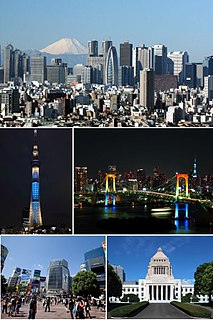| 23rd Japan Academy Prize | |
|---|---|
| Date | March 10, 2000 |
| Site | Grand Prince Hotel New Takanawa, Tokyo, Japan |
The 23rd Japan Academy Prize(第23回日本アカデミー賞) is the 23rd edition of the Japan Academy Prize, an award presented by the Nippon Academy-Sho Association to award excellence in filmmaking. It awarded the best films of 1999 and it took place on March 10, 2000 at the Grand Prince Hotel New Takanawa in Tokyo, Japan. [1] [2] The ceremony was hosted by actor and television presenter Hiroshi Sekiguchi and actress Mieko Harada.
Filmmaking is the process of making a film, generally in the sense of films intended for extensive theatrical exhibition. Filmmaking involves a number of discrete stages including an initial story, idea, or commission, through screenwriting, casting, shooting, sound recording and reproduction, editing, and screening the finished product before an audience that may result in a film release and exhibition. Filmmaking takes place in many places around the world in a range of economic, social, and political contexts, and using a variety of technologies and cinematic techniques. Typically, it involves a large number of people, and can take from a few months to several years to complete.
The year 1999 in film included Stanley Kubrick's final film Eyes Wide Shut, Pedro Almodóvar's first Oscar-winning film All About My Mother, the science-fiction hit The Matrix, the Deep Canvas-pioneering Disney animated feature Tarzan and Best Picture-winner American Beauty and the well-received The Green Mile, as well as the animated works The Iron Giant, Toy Story 2, Stuart Little and South Park: Bigger, Longer & Uncut. Other noteworthy releases included Spike Jonze and Charlie Kaufman's breakout film Being John Malkovich and M. Night Shyamalan's breakout film The Sixth Sense, the controversial Fight Club and Paul Thomas Anderson's Magnolia. The year also featured George Lucas' top-grossing Star Wars: Episode I – The Phantom Menace.

Tokyo, officially Tokyo Metropolis, one of the 47 prefectures of Japan, has served as the Japanese capital since 1869. As of 2014, the Greater Tokyo Area ranked as the most populous metropolitan area in the world. The urban area houses the seat of the Emperor of Japan, of the Japanese government and of the National Diet. Tokyo forms part of the Kantō region on the southeastern side of Japan's main island, Honshu, and includes the Izu Islands and Ogasawara Islands. Tokyo was formerly named Edo when Shōgun Tokugawa Ieyasu made the city his headquarters in 1603. It became the capital after Emperor Meiji moved his seat to the city from Kyoto in 1868; at that time Edo was renamed Tokyo. Tokyo Metropolis formed in 1943 from the merger of the former Tokyo Prefecture and the city of Tokyo. Tokyo is often referred to as a city but is officially known and governed as a "metropolitan prefecture", which differs from and combines elements of a city and a prefecture, a characteristic unique to Tokyo.
Contents
Poppoya won nine awards, including Picture of the Year. Other winners included Dreammaker and Kikujiro with two, and Gohatto , I Love You, Messengers, Moumantai, Osaka Story , Owls' Castle , Salaryman Kintarō , Spellbound , The Geisha House , and The Sixth Sense with one.

Poppoya is a 1999 Japanese film directed by Yasuo Furuhata. It was Japan's submission to the 72nd Academy Awards for the Academy Award for Best Foreign Language Film, but was not accepted as a nominee. It was chosen as Best Film at the Japan Academy Prize ceremony. The film was the third-highest-grossing film of the year in Japan.
The Japan Academy Prize for Picture of the Year is a film award given to the best film at the annual Japan Academy Prize.

Kikujiro is a 1999 Japanese film starring, written, and directed by Takeshi Kitano. Its score was composed by Joe Hisaishi. The film was entered into the 1999 Cannes Film Festival. This movie was remade in Tamil as Nandalala.


